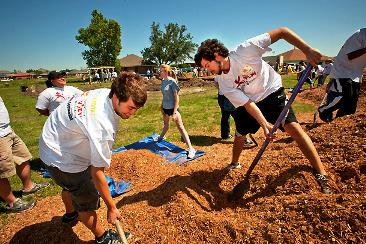We Accelerate Your Secular Projects
Dear Secular Leaders:
If we really want to change the world, we have to change.
If you ask someone about gay marriage, they’re aware the issue exists. They’ve never heard, “Do you want to end discrimination against secular people? What about church and state separation? Should government use more science in decision-making?” The secular movement has failed even to get noticed by the mainstream world, except through controversy that makes them hate us.
We’ve even failed to inspire our own people. Mormons raise $7 billion a year. We outnumber them but the secular movement raises only $15 million. How do we fix this?
We need professionals. The Secular Policy Institute adds a best practice, world-class team to accelerate secular projects. We talent scout them from you, our 300 coalition partners, and from our 50 Fellows, Advocates, and staff. Then we turbocharge them:
- Packaging your proposal professionally for funding. Let us make you a video.
- Maximizing impact with strategic consulting.
- Funding your ideas through big donors and grassroots givers in our network. Let us make you a Kickstarter.
- Training your team in best management practices.
- Organizing resources from inside and outside the secular community.
- Partnering your project with our local and international contacts in government, media, and business.
- Adding prestige through our celebrity Fellows and Advocates.
- Promoting your success to worldwide media.
- Lobbying government and other powerful decision-makers worldwide with your success.
It’s free. We just want to be able to say we were there when you changed the world.
You have the ideas and the people power. We have the experience and the connections. Email Aaron at aaron@secularpolicyinstitute.net.
Secrets to an Effective Project
The secret to an effective project is to keep impact in mind at all times:

- Don’t attack religion. It doesn’t work, it increases hate against us, and makes it harder for us to move government and media. The Secular Policy Institute has many churches in our coalition who support our goals.
- Choose an inspiring topic. Donors and volunteers love human stories. Are there people in real pain you are helping? Is your project coming out of nowhere, or are you latching onto widely acknowledged problem that already has momentum in the public consciousness?
- Be strategic. Does your project further the secular movement? Will it draw media attention? Does it result in a “report” with findings that will help us lobby governments for change?
- Be clear. Readers won’t bother to connect the dots and find your project’s value. You need to work hard on clarity. Get an outsider’s perspective on whether your proposal is compelling or ordinary.
- Be measurable. Your claim to make a difference will be more credible if its goals are measurable
- Make it your own. Nobody likes a “me too” project. Get creative and find a way to be notable. Anyone can hold a bake sale, but the ice bucket challenge to raise money for ALS research was a creative concept that built a distinct brand and captured media attention.
- Be newsworthy. Projects don’t go viral unless they deserve to go viral.
- Be timely. Why is your project urgent? Necessary right now? What’s the deadline?
- Be professional. Ranting, sloppy work doesn’t get funded. Step up your game.
- Focus on what donors get. The #1 rule of marketing is that people don’t care. You have to make them care. Don’t write your project from the perspective of what you get. Write it from the perspective of how you’ll make donors and volunteers feel fulfilled, involved, and creatively challenged to have helped real people.
- Invest in inexpensive “wows”. There are plenty of easy things you can do to impress potential donors. Build a brand with a website and logo. Start a petition to show grassroots support. Make a video showing the people in pain you intend to help.
- Do your homework. They may not read the details, but donors want to know that the details are there and have been thought through. Research similar projects and contact their organizers for advice. Then write. Writing is an active part of defining your project. You’ll find as you write that it also helps you think.
- Be responsive. Write back immediately to emails. When you get a request, try to get it done overnight to make an impression. Have a good attitude towards the pain of communicating with someone who will need more from you to “get it” than you expect.
Here’s an example. Let’s say you want to start a scholarship to send secular people to college. That’s a good cause, but there are no visuals to students writing an application. Scholarships aren’t notable enough to be newsworthy. They are expensive and you only help one person.
So make it a journalism scholarship for foreign bloggers who have been penalized by their country for writing about secularism. Find a notable “poster child” and create an awards ceremony to which you can invite a secular celebrity like Sarah Silverman. Politicians like to look good by supporting freedom of speech. Get one to attend as well. Partner with a big name University to start a “Donor Name Center for Journalism” to help these students blog about their experiences being sanctioned overseas and to get more exposure for their works. Organize a book where each of your recipients writes one chapter, and some SPI fellows write as well. Create a blog where secular students in journalism talk about their secular life and studies and draw in students from all over the world who did not win a scholarship but want to contribute their personal stories. Create a mentor program for senior journalists to advise the students and encourage them to take on secular topics. Perhaps part of their scholarship is a work program where students are paid for their time teaching afterschool science programs at local high schools.
Any idea can be recrafted for higher impact.
Stuck on getting a good idea? Newsworthy ideas are everywhere! Just read the news to find them. Adapt a project that inspires you to your own circumstances. Add a clever twist that makes it your own.
How to Submit a Project
The Secular Policy Institute gives free support to projects that further our goals:
- To separate church and state
- To end discrimination towards those who embrace secular values
- To get government to use more science and reason in public policy
 We operate worldwide, and seek diversity of race, gender, sexuality, and international location in our projects. We partner with religious groups and anyone who shares one of our goals.
We operate worldwide, and seek diversity of race, gender, sexuality, and international location in our projects. We partner with religious groups and anyone who shares one of our goals.
Don’t worry about writing a formal proposal. Contact us and let us warmly engage with you. We are your partners.
Together we’ll build a few paragraphs on these topics:
- Overview. This section acts as a “hook” that gets potential donors and volunteers to keep reading. Think of yourself as conversationally falling off of a cliff. You need to arrest that fall in the first paragraph by saying something “wow”.
- The Challenge. We are too eager to rush into solutions when we haven’t even convinced anyone that a problem exists yet. If what you are doing is so important, where are the people in pain? Think like a brainiac and go high level, writing about the trends in society that are causing the pain.
- The Opportunity. Stay high level and speak to the trends from the last chapter. How can you untie them? What positive trends, such as new technology and new demographics that make possible a creative solution? You have an opportunity to cleverly exploit existing trends to defuse the challenge.
- Impact. How will you measure your project’s success, and how much good do you expect to do? How have you modified your project to maximize impact?
- Project Plan. Keep it short, but if you’re building a playground, we need to know that you’ve been in contact with an architect and a lumber yard donating wood. Make us believe that your project is feasible. You should have through it through at least that much. Name names. Be specific about which organizations and people you want to partner with or give help to.
- Needs. What are you looking for? Be specific. Sometimes you need volunteers, donated supplies, connections to media, or government connections. When it comes to a budget, find a middle ground where you aren’t wasting money, but you also aren’t starving your project and burning out your volunteers. A good way to think about asking for a bigger budget is this: does your project have the “return on investment” potential to deserve bigger funding?
Let’s Get Started
Want some examples? See our proposed projects. As of April, our big push for projects is brand new, so there are only a couple right now. Expect more soon.
Feeling overwhelmed? Don’t write anything. Just email me at johnny@secularpolicyinstitute.net and I or someone on my team will walk you through it. We will be eager to take your raw ideas and give you a world-class polish!
